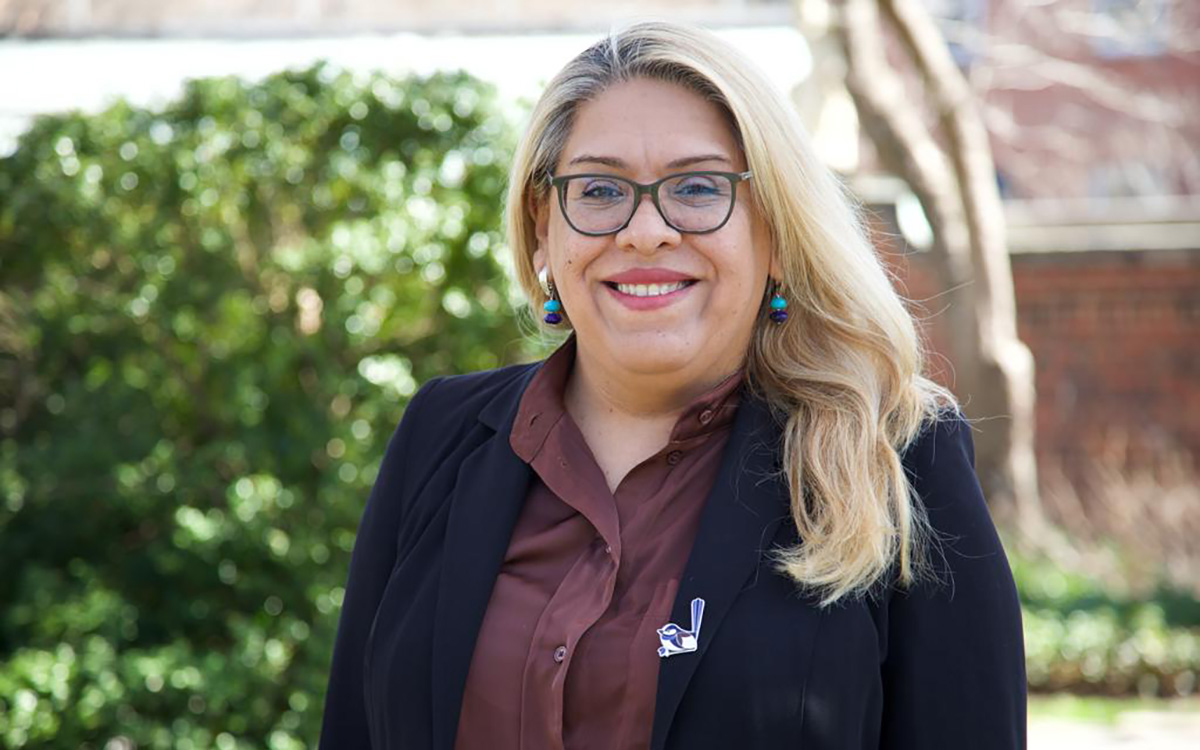South America
Argentina’s former special envoy for LGBTQ rights criticizes new government
Alba Rueda resigned before President Javier Milei took office

Argentina’s former Special Representative on Sexual Orientation and Gender Identity during an exclusive interview with the Washington Blade discussed recent setbacks in LGBTQ rights in the country.
Alba Rueda, a transgender woman who held the position in former President Alberto Fernández’s administration, revealed the challenges and risks faced by the queer community in the South American country in which 57.4 percent of the population lives in poverty, which is the highest rate in 20 years. The Catholic University of Argentina’s Observatory of Social Debt also notes Argentina began 2024 with a 20.6 percent inflation rate; this figure is 254.2 percent from year-to-year.
President Javier Milei took office in December.
“We received a request from our president at the time, Alberto Fernández, that we submit our resignation as part of the team that integrates the presidency,” Rueda told the Washington Blade.
Rueda explained she “resigned on Nov. 28, a few days before, to make it effective on Dec. 10 with the new government and since then, since Milei, the presidency and the chancellor, Daniela Elena Mondino, took office, (her post) was eliminated. It was already foreseeable according to Milei’s statements about closing the offices on gender perspective.”
“Our special representation was closed. My colleagues were redirected to other areas,” Rueda explained. “The person who accompanied me in political terms resigned with me, so the two of us left on Dec. 10, and the rest of the technical staff was relocated within the Foreign Ministry.”
The former ambassador described how the closure of her position and the elimination of the Women, Gender and Diversity Ministry represent a significant setback in the protection of LGBTQ rights in Argentina. She stressed that while the country was a pioneer in passing progressive laws for the LGBTQ community, the lack of effective implementation and declining government commitment are jeopardizing these advances.
“We argued that it had been a long time since very significant laws were passed in our country and that they had to be translated into national and local public policies,” she explained. “LGBTIQ+ people not only have to be protected formally in the law, but we have to change and modify the living conditions of our community that has experienced discrimination, violence and persecution for many years.”
She added “to change that culture, there needs to be not only a formal framework, but functioning democratic institutions”
“This elimination has a direct affectation to the rights of LGBTIQ+ people,” said Rueda.
The interview revealed how Milei’s government has dismantled institutions and policies designed to protect queer people.
“We created, for example, a program that was the first program at the national level that was an assistance program for trans people,” Rueda said. “This program of accompaniment for the protection of their rights was in the sub-secretariat and provided economic support and was working on solving all the procedures related to access to education, health, employment, issues related to substantive issues.”
Rueda highlighted that recent political decisions are not only curtailing LGBTQ rights, but are also directly affecting the community, especially those who are economically vulnerable. The elimination of assistance programs and lack of legal protections are leaving many LGBTQ people in a vulnerable position.
“Economic rights have been affected, as is the inflationary process and the inflationary decisions of this last month are directly affecting the middle class, lower middle class and the most impoverished sectors,” said Rueda. “It directly affects not only economic rights of the LGBTIQ+ population that belongs to these classes, but also affects rights that are not being worked within the framework or promoted within public policies.”
Rueda also raised concerns about a possible increase in violence towards LGBTQ people in Argentina, comparable to what has been observed in other countries under hostile political leadership. Rueda stated incidents of violence have already been recorded and that the current political climate is fueling discrimination and hatred towards the LGBTQ community.
“It started during the campaign, and I think that during the whole last year we saw how effectively, punctually in social networks and in the public space there was a whole attack on LGBTQ+ people,” she said. “Let’s not forget during the campaign that the main candidates who are the president, the vice president and the chancellor expressed themselves in the wrong way, generating with their ignorance a completely wrong message in the media, amplifying these messages that directly affect the rights of LGBTQ+ people.”
Rueda recalled the vice president “expressed in her campaign that for her it was not necessary to call marriage a union of people of the same sex … that was the civil union and saying that marriage was a figure associated with religious aspects.”
While Milei “in an interview also during the presidential campaign, said that he did not care if people want to have sex with other people of the same sex or with animals, such as elephants, equating and putting on the same level the consensual relations of people of the same sex over 18 as zoophilia.”
The situation has reached the point that different WhatsApp groups created to seek help during the COVID-19 pandemic became active again because of the interruption of the National Social Protection Plan and changes to an employment program that made vulnerable trans people in Argentina more at-risk.
“We are in a bad moment for the rights and quality of life of LGBTQ+ people,” Rueda said.
Colombia
Gay Venezuelan opposition leader: Country’s future uncertain after Maduro ouster
Yendri Velásquez fled to Colombia in 2024 after authorities ‘arbitrarily detained’ him

A gay Venezuelan opposition leader who currently lives in Colombia says his country’s future is uncertain in the wake of now former President Nicolás Maduro’s ouster.
The Washington Blade spoke with Yendri Velásquez on Thursday, 12 days after American forces seized Maduro and his wife, Cilia Flores, at their home in Caracas, the Venezuelan capital, during an overnight operation.
Maduro and Flores on Jan. 5 pleaded not guilty to federal drug charges in New York. The Venezuelan National Assembly the day before swore in Delcy Rodríguez, who was Maduro’s vice president, as the country’s acting president.
Velásquez, who lives in the Colombian capital of Bogotá, described the events surrounding Maduro’s ouster as “very confusing.”
“It was a very surprising thing that left me in shock,” Velásquez told the Blade. “We also thought, at least from the perspective of human rights, that the United States was going to respect international law and not go to the extreme of bombing and extracting Maduro.”
“Other questions also arise,” he added. “What could have been done? What else could have been done to avoid reaching this point? That is the biggest question posed to the international community, to other countries, to the human rights mechanisms we established before Trump violated international law, precisely to preserve these mechanisms and protect the human rights of Venezuelan people and those of us who have been forced to flee.”
Velásquez three years ago founded the Venezuelan Observatory of LGBTIQ+ Violence. He also worked with Tamara Adrián, a lawyer who in 2015 became the first openly transgender woman elected to the Venezuelan National Assembly, for more than a decade.
Members of Venezuela’s military counterintelligence agency, known by the Spanish acronym DGCIM, on Aug. 3, 2024, “arbitrarily detained” Velásquez as he was trying to leave the country to attend a U.N. human rights event in Geneva.
Velásquez told the Blade he was “forcibly disappeared” for nearly nine hours and suffered “psychological torture.” He fled to Colombia upon his release.
Two men on Oct. 14, 2025, shot Velásquez and Luis Peche Arteaga, a Venezuelan political consultant, as they left a Bogotá building.
The assailants shot Velásquez eight times, leaving him with a fractured arm and hip. Velásquez told the Blade he has undergone multiple surgeries and has had to learn how to walk again.
“This recovery has been quite fast, better than we expected, but I still need to finish the healing process for a fractured arm and complete the physical therapy for the hip replacement I had to undergo as a result of these gunshots,” he said.

María Corina Machado, who won the 2025 Nobel Peace Prize, and other Venezuelan opposition leaders said Maduro’s government targeted Velásquez and Peche. Colombian President Gustavo Petro and his government also condemned the attack.
Colombian authorities have yet to arrest anyone in connection with the attack.
Velásquez noted to the Blade he couldn’t sleep on Jan. 3 because “of the aches and pains” from the shooting. He said a friend who is “helping me out and looking after my things” was the one who told him about the operation the U.S. carried out to seize Maduro and Flores.
“He said, ‘Look at this! They’re bombing Caracas! And I was like, ‘What is this?'” recalled Velásquez.
White House ‘not necessarily’ promoting human rights agenda
Velásquez noted Rodríguez “is and forms part of the mechanisms of repression” that includes DGCIM and other “repressive state forces that have not only repressed, but also tortured, imprisoned, and disappeared people simply for defending the right to vote in (the) 2024 (election), simply for protesting, simply for accompanying family members.” Velásquez told the Blade that “there isn’t much hope that things will change” in Venezuela with Rodríguez as president.
“Let’s hope that countries and the international community can establish the necessary dialogues, with the necessary intervention and pressure, diplomatically, with this interim government,” said Velásquez, who noted hundreds of political prisoners remain in custody.
He told the Blade the Trump-Vance administration does not “not necessarily” have “an agenda committed to human rights. And we’ve seen this in their actions domestically, but also in their dealings with other countries.”
“Our hope is that the rest of the international community, more than the U.S. government, will take action,” said Velásquez. “This is a crucial moment to preserve democratic institutions worldwide, to preserve human rights.”
Velásquez specifically urged the European Union, Colombia, Brazil, and other Latin American countries “to stop turning a blind eye to what is happening and to establish bridges and channels of communication that guarantee a human rights agenda” and to try “to curb the military advances that the United States may still be considering.”

Velásquez told the Blade he also plans to return to Venezuela when it is safe for him to do so.
“My plan will always be to return to Venezuela, at least when it’s no longer a risk,” he said. “The conditions aren’t right for me to return because this interim government is a continuation of Maduro’s government.”
Editor’s note: International News Editor Michael K. Lavers was on assignment in Bogotá, Colombia, from Jan. 5-10.
Venezuela
AHF client in Venezuela welcomes Maduro’s ouster
‘This is truly something we’ve been waiting for’ for decades

An AIDS Healthcare Foundation client who lives in Venezuela told the Washington Blade he welcomes the ouster of his country’s former president.
The client, who asked the Blade to remain anonymous, on Thursday said he felt “joy” when he heard the news that American forces seized Nicolás Maduro and his wife, Cilia Flores, at their home in Caracas, the Venezuelan capital, during an overnight operation on Jan. 3.
“This is truly something we’ve been waiting for for 26 or 27 years,” the AHF client told the Blade.
Hugo Chávez became Venezuela’s president in 1999. Maduro succeeded him in 2013 after he died.
“I’ve always been in opposition,” said the AHF client, who stressed he was speaking to the Blade in his personal capacity and not as an AHF representative. “I’ve never agreed with the government. When I heard the news, well, you can imagine.”
He added he has “high hopes that this country will truly change, which is what it needed.”
“This means getting rid of this regime, so that American and foreign companies can invest here and Venezuela can become what it used to be, the Venezuela of the past,” he said.
The AHF client lives near the Colombia-Venezuela border. He is among the hundreds of Venezuelans who receive care at AHF’s clinic in Cúcuta, a Colombian city near the Táchira River that marks the border between the two countries.
The Simón Bolívar Bridge on the Colombia-Venezuela border on May 14, 2019. (Washington Blade video by Michael K. Lavers)
The AHF client praised U.S. President Donald Trump and reiterated his support for the Jan. 3 operation.
“It was the only way that they could go,” he said.
The Venezuelan National Assembly on Jan. 4 swore in Delcy Rodríguez, who was Maduro’s vice president, as the country’s acting president. The AHF client with whom the Blade spoke said he is “very optimistic” about Venezuela’s future, even though the regime remains in power.
“With Maduro leaving, the regime has a certain air about it,” he said. “I think this will be a huge improvement for everyone.”
“We’re watching,” he added. “The actions that the United States government is going to implement regarding Venezuela give us hope that things will change.”
Colombia
Colombians protest against Trump after he threatened country’s president
Tens of thousands protested the US president in Bogotá

BOGOTÁ, Colombia — Tens of thousands of people on Wednesday gathered in the Colombian capital to protest against President Donald Trump after he threatened Colombian President Gustavo Petro.
The protesters who gathered in Plaza Bolívar in Bogotá held signs that read, among other things, “Yankees go home” and “Petro is not alone.” Petro is among those who spoke.
The Bogotá protest took place four days after American forces seized now former Venezuelan President Nicolás Maduro and his wife, Cilia Flores, at their home in Caracas, the Venezuelan capital, during an overnight operation.
The Venezuelan National Assembly on Sunday swore in Delcy Rodríguez, who was Maduro’s vice president, as the country’s acting president. Maduro and Flores on Monday pleaded not guilty to federal drug charges in New York.
Trump on Sunday suggested the U.S. will target Petro, a former Bogotá mayor and senator who was once a member of the M-19 guerrilla movement that disbanded in the 1990s. Claudia López, a former senator who would become the country’s first female and first lesbian president if she wins Colombia’s presidential election that will take place later this year, is among those who criticized Trump’s comments.
The Bogotá protest is among hundreds against Trump that took place across Colombia on Wednesday.
Petro on Wednesday night said he and Trump spoke on the phone. Trump in a Truth Social post confirmed he and his Colombian counterpart had spoken.
“It was a great honor to speak with the president of Colombia, Gustavo Petro, who called to explain the situation of drugs and other disagreements that we have had,” wrote Trump. “I appreciated his call and tone, and look forward to meeting him in the near future. Arrangements are being made between Secretary of State Marco Rubio and the foreign minister of Colombia. The meeting will take place in the White House in Washington, D.C.”





















